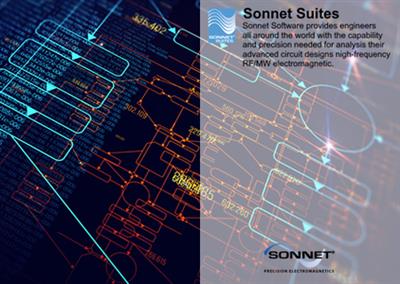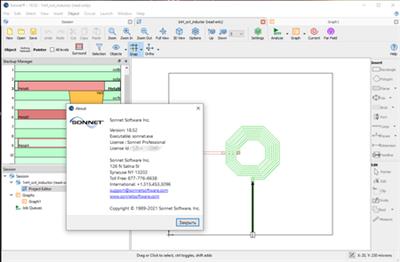
Free Download Sonnet Suites 18.52 | 389.4 mb
The software developer Sonnet Software Inc. is pleased to announce the availability of Sonnet Suites 18.52. The new v18 builds upon the v17 revolution, adding ground breaking new technologies, enhancements, and robustness to the gold standard product from the world's most tenured brand in EM simulation.
Product:Sonnet Suites
Version:18.52 Professional
Supported Architectures:x64
Website Home Page :www.sonnetsoftware.com
Languages Supported:english
System Requirements:Windows *
Size:389.4 mb
What's New in this Release
- The all-new TrueVolume metal model uses fully 3D subsections with volumetric currents to divide the volume of a thick metal model conductor into rectangular metal cubes, and then uses Sonnet's volume subsections to model those cubes, greatly reducing the need for large amounts of metal layers in many thick metal applications. This is a major introduction which blurs the lines between a 3D Planar and a 3D Arbitrary solver.
- The new Sonnet Technology File Editor, is a separate application bundled with the suite, and allows you to directly edit and create Sonnet Technology Files (.stf), which can be saved as templates, applied to projects, and more. Within the technology file editor, a Layer Mapping dialog enables you to map CAD layers and drawing purposes to Sonnet's tech layers. The layer mappings can now be saved to the Sonnet Technology File (.stf) files which now supports CAD Drawing Layers and purposes.
- The User Equation Editor allows you to define custom equations to be added as curves in a graph.
- You may now view 3D Antenna Pattern of your project.
- Sonnet now provides you with Graph and Pattern templates which contain settings of a graph, including color, format, port properties, frequencies, angles, or other settings used in your graph. The software provides a few common templates, but you may create your own templates to save them in a template folder for later use.
- Sonnet's ODB++translator now supports ODB++7.x and 8.x. databases.
- Sonnet has a redesigned home page giving you quick and easy access to your recently used projects and session.
- You may now Description more responses in the Current Density tab, including volume currents (in amps per square meter) and the current phase.
- You may now add Line Segment Markers to a graph or antenna pattern.
- When a list of sources becomes too long, you may now remove unused sources which are no longer in use with a simple command.
- The Sonnet Technology File (.stf) format now supports purposes.
https://paste2.org/V2HYgAAK
Sonnet's suitesof high-frequency electromagnetic (EM) Software are aimed at today's demanding design challenges involving predominantly planar (3D planar) circuits and antennas. Predominantly planar circuits include microstrip, stripline, coplanar waveguide, PCB (single and multiple layers) and combinations with vias, vertical metal sheets (z-directed strips), and any number of layers of metal traces embedded in stratified dielectric material. The Sonnet Suites develop precise RF models (S-, Y-, Z-parameters or extracted SPICE model) for planar circuits and antennas. The software requires a physical description of your circuit (arbitrary layout and material properties for metal and dielectrics), and employs a rigorous Method-of-Moments EM analysis based on Maxwell's equations that includes all parasitic, cross-coupling, enclosure and package resonance effects. Sonnet maintains a single, dedicated focus on providing the industry's most accurate and reliable high frequency planar EM software. Our aim is to make it easy for our customers to either develop and analyze designs within our software, or to incorporate our tools into their existing design processes and frameworks. Customers need never commit to a proprietary framework in order to get the best in planar EM analysis.
Sonnet's new v18 builds upon the v17 revolution, adding ground breaking new technologies, enhancements, and robustness to the gold standard product from the world's most tenured brand in EM simulation.
Modeling Anisotropic Substrates
Did you know that permittivity is dependent on the direction of fields? This is called anisotropy, and not only does Sonnet support this in analysis, but we have developed a technique to characterize material as well. If you need accurate simulation, this tutorial is for you.
Founded in 1983 by Dr. James C. Rautio,Sonnet Software Inc.is a private company dedicated completely to the development of commercial high frequency EM software. We take great pride in providing quality technical support for our products-which we believe to be crucial for high-end technical software products. Sonnet Software, Inc. is based in Syracuse, NY, USA with representatives across the globe.

Rapidgator-->Click Link PeepLink Below Here Contains Rapidgator
http://peeplink.in/a0ec931f2d52
Uploadgig
6s9ec.Sonnet.Suites.18.52.rar
NitroFlare
6s9ec.Sonnet.Suites.18.52.rar
Links are Interchangeable - Single Extraction
